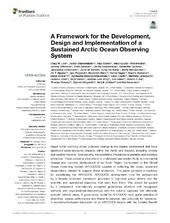A Framework for the Development, Design and Implementation of a Sustained Arctic Ocean Observing System
Lee, Craig M.; Starkweather, Sandy; Eicken, Hajo; Timmermans, Mary-Louise; Wilkinson, Jeremy; Sandven, Stein; Dukhovskoy, Dmitry; Gerland, Sebastian; Grebmeier, Jacqueline; Intrieri, Janet M.; Kang, Sung-Ho; McCammon, Molly; Nguyen, An T.; Polyakov, Igor; Rabe, Benjamin; Sagen, Hanne; Seeyave, Sophie; Volkov, Denis; Beszczynska-Möller, Agnieszka; Chafik, Léon; Dzieciuch, Matthew; Goni, Gustavo; Hamre, Torill; King, Andrew Luke; Olsen, Are; Raj, Roshin Pappukutty; Rossby, Thomas; Skagseth, Øystein; Søiland, Henrik; Sørensen, Kai
Peer reviewed, Journal article
Published version

Åpne
Permanent lenke
https://hdl.handle.net/1956/20979Utgivelsesdato
2019-08-08Metadata
Vis full innførselSamlinger
- Geophysical Institute [1198]
Originalversjon
https://doi.org/10.3389/fmars.2019.00451Sammendrag
Rapid Arctic warming drives profound change in the marine environment that have significant socio-economic impacts within the Arctic and beyond, including climate and weather hazards, food security, transportation, infrastructure planning and resource extraction. These concerns drive efforts to understand and predict Arctic environmental change and motivate development of an Arctic Region Component of the Global Ocean Observing System (ARCGOOS) capable of collecting the broad, sustained observations needed to support these endeavors. This paper provides a roadmap for establishing the ARCGOOS. ARCGOOS development must be underpinned by a broadly-endorsed framework grounded in high-level policy drivers and the scientific and operational objectives that stem from them. This should be guided by a transparent, internationally accepted governance structure with recognized authority and organizational relationships with the national agencies that ultimately execute network plans. A governance model for ARCGOOS must guide selection of objectives, assess performance and fitness-to-purpose, and advocate for resources. A requirements-based framework for an ARCGOOS begins with the Societal Benefit Areas (SBAs) that underpin the system. SBAs motivate investments and define the system’s science and operational objectives. Objectives can then be used to identify key observables and their scope. The domains of planning/policy, strategy, and tactics define scope ranging from decades and basins to focused observing with near real time data delivery. Patterns emerge when this analysis is integrated across an appropriate set of SBAs and science/operational objectives, identifying impactful variables and the scope of the measurements. When weighted for technological readiness and logistical feasibility, this can be used to select Essential ARCGOOS Variables, analogous to Essential Ocean Variables of the Global Ocean Observing System. The Arctic presents distinct needs and challenges, demanding novel observing strategies. Cost, traceability and ability to integrate region-specific knowledge have to be balanced, in an approach that builds on existing and new observing infrastructure. ARCGOOS should benefit from established data infrastructures following the Findable, Accessible, Interoperable, Reuseable Principles to ensure preservation and sharing of data and derived products. Linking to the Sustaining Arctic Observing Networks (SAON) process and involving Arctic stakeholders, for example through liaison with the International Arctic Science Committee (IASC), can help ensure success.
Utgiver
Frontiers MediaTidsskrift
Frontiers in Marine ScienceOpphavsrett
Copyright 2019 Lee, Starkweather, Eicken, Timmermans, Wilkinson, Sandven, Dukhovskoy, Gerland, Grebmeier, Intrieri, Kang, McCammon, Nguyen, Polyakov, Rabe, Sagen, Seeyave, Volkov, Beszczynska-Möller, Chafik, Dzieciuch, Goni, Hamre, King, Olsen, Raj, Rossby, Skagseth, Søiland and Sørensen.Beslektede innførsler
Viser innførsler beslektet ved tittel, forfatter og emneord.
-
The Impact of Prolonged Observation on the Role of the "Neutral Observer" in small groups
Øyen, Else (Acta Sociologica, Peer reviewed; Journal article, 1972) -
Current systematic carbon-cycle observations and the need for implementing a policy-relevant carbon observing system
Ciais, Philippe; Dolman, AJ; Bombelli, A; Duren, R; Peregon, A; Rayner, PJ; Miller, C; Gobron, N; Kinderman, G; Marland, G; Gruber, N; Chevallier, F; Andres, RJ; Balsamo, G; Bopp, L; Breon, F-M; Broquet, G; Dargaville, R; Battin, TJ; Borges, A; Bovensmann, H; Buchwitz, M; Butler, J; Canadell, JG; Cook, RB; Defries, R; Engelen, R; Gurney, KR; Heinze, Christoph; Heimann, M; Held, A; Henry, M; Law, B; Luyssaert, S; Miller, J; Moriyama, T; Moulin, C; Myneni, RB; Nussli, C; Obersteiner, M; Ojima, D; Pan, Y; Paris, J-D; Piao, SL; Poulter, B; Plummer, S; Quegan, S; Raymond, P; Reichstein, M; Rivier, L; Sabine, C; Schimel, D; Tarasova, O; Valentini, R; Wang, R; Van, Der,Werf,G; Wickland, D; Williams, M; Zehner, C (Peer reviewed; Journal article, 2014-07-03)A globally integrated carbon observation and analysis system is needed to improve the fundamental understanding of the global carbon cycle, to improve our ability to project future changes, and to verify the effectiveness ... -
Observing system evaluation based on ocean data assimilation and prediction systems: On-going challenges and future vision for designing/supporting ocean observational networks
Fujii, Yosuke; Rémy, Elisabeth; Hao, Zuo; Oke, Peter; Halliwell, George; Gasparin, Florent; Benkiran, Mounir; Loose, Nora; Cummings, James; Xie, Jiping; Xue, Yan; Masuda, Shuhei; Smith, Gregory C.; Balmaseda, Magdalena; Germineaud, Cyril; Lea, Daniel J.; Larnicol, Gilles; Bertino, Laurent; Bonaduce, Antonio; Brasseur, Pierre; Donion, Craig; Heimbach, Patrick; Kim, YoungHo; Kourafalou, Villy; Le Traon, Pierre-Yves; Martin, Matthew; Paturi, Shastri; Tranchant, Benoit; Usui, Norihisa (Peer reviewed; Journal article, 2019-07-29)This paper summarizes recent efforts on Observing System Evaluation (OS-Eval) by the Ocean Data Assimilation and Prediction (ODAP) communities such as GODAE OceanView and CLIVAR-GSOP. It provides some examples of existing ...
